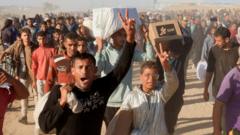Rear Adm. Ali Shamkhani's appearance at a funeral procession sheds light on the increasing stakes of the Israeli-Iranian conflict and the broader implications of military actions in the region.
**Iranian Official Survives Israeli Missile Attack Amid Ongoing Tensions**

**Iranian Official Survives Israeli Missile Attack Amid Ongoing Tensions**
In a surprising turn of events, an Iranian military commander presumed dead after an Israeli strike has been spotted alive, raising questions about the impact of the ongoing conflict.
Amid the escalating tensions in the Middle East, Rear Adm. Ali Shamkhani, a senior Iranian official and advisor to Supreme Leader Ayatollah Ali Khamenei, was recently reported to have survived a significant Israeli missile attack. Initially presumed dead, Shamkhani made a public appearance at a funeral for fallen military commanders in Tehran, using a cane and appearing visibly frail, thereby contradicting earlier reports suggesting his demise following the Israeli assault on June 13.
The missile strike targeted Shamkhani's penthouse in an affluent Tehran high-rise, marking the onset of a 12-day military offensive by Israel, later joined by the United States, aimed primarily at Iran's nuclear capabilities. Israeli officials indicated that the operations focused on critical military installations, including nuclear facilities and missile production sites, while also inflicting severe damage to residential areas purportedly housing military personnel and scientists.
During and after the attack, Iran confirmed significant casualties, including 935 deaths, with a substantial portion being women and children, as well as the loss of 30 military commanders. The damage inflicted on Shamkhani’s residence was catastrophic, leaving the structure heavily compromised.
Shamkhani's role has been pivotal in past negotiations concerning Iran's contentious nuclear program, making his survival significant in the context of Iran's response to military actions and its diplomatic strategy moving forward. His reappearance might influence ongoing debates about military action in the region and the potential for renewed negotiations with global powers amidst rising tensions.
The missile strike targeted Shamkhani's penthouse in an affluent Tehran high-rise, marking the onset of a 12-day military offensive by Israel, later joined by the United States, aimed primarily at Iran's nuclear capabilities. Israeli officials indicated that the operations focused on critical military installations, including nuclear facilities and missile production sites, while also inflicting severe damage to residential areas purportedly housing military personnel and scientists.
During and after the attack, Iran confirmed significant casualties, including 935 deaths, with a substantial portion being women and children, as well as the loss of 30 military commanders. The damage inflicted on Shamkhani’s residence was catastrophic, leaving the structure heavily compromised.
Shamkhani's role has been pivotal in past negotiations concerning Iran's contentious nuclear program, making his survival significant in the context of Iran's response to military actions and its diplomatic strategy moving forward. His reappearance might influence ongoing debates about military action in the region and the potential for renewed negotiations with global powers amidst rising tensions.






















